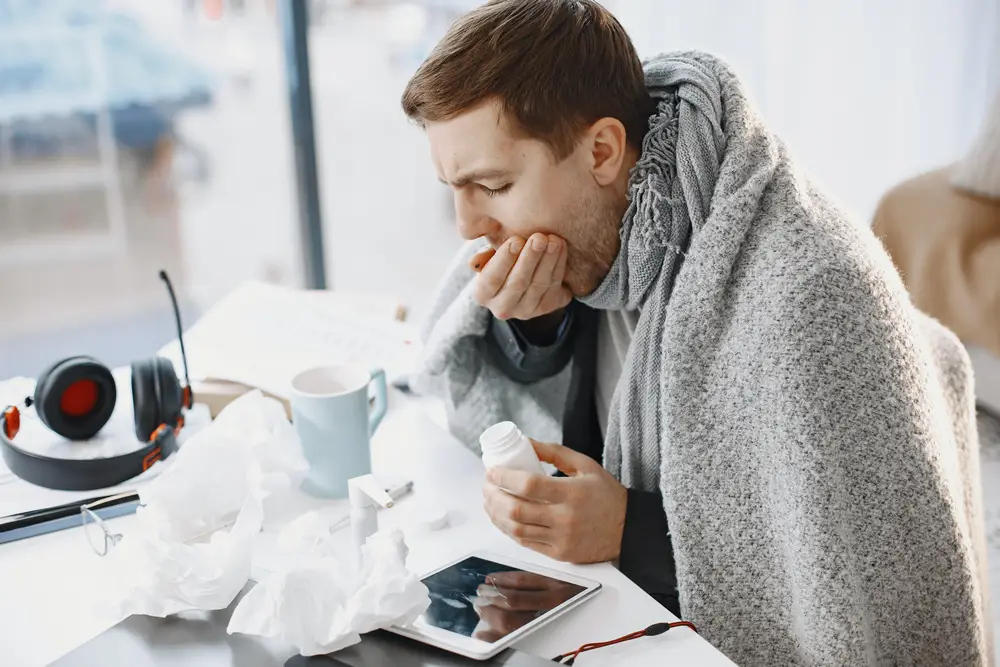
Coughing while scuba diving can be quite challenging and potentially hazardous due to the equipment and the underwater environment.
If you cough while scuba diving there’s a risk of inhaling water if your regulator isn’t properly in your mouth, it can cause your regulator to dislodge from your mouth or create mask leaks. Coughing can disrupt your buoyancy control and catch you off guard while underwater and cause you to panic.
Here are some of the potential effects and considerations if you were to cough while scuba diving:
- Water Inhalation: When you cough, there is a risk of inhaling water if your regulator is not properly in your mouth or if it becomes dislodged. Water entering your airway can cause choking and breathing difficulties.
- Regulator Disruption: Coughing forcefully can cause your regulator (the device you breathe through) to be dislodged from your mouth, leading to an interruption in your air supply. It’s crucial to keep a firm grip on your regulator and maintain proper breathing techniques.
- Mask Leaks: Coughing can create pressure changes in your mask, potentially causing it to leak. A leaking mask can let water enter, impairing your vision and making it challenging to see underwater.
- Buoyancy Control: Coughing can disrupt your buoyancy control by altering your breathing patterns and body position. This may lead to difficulties maintaining proper depth and stability, potentially causing you to ascend or descend unintentionally.
- Distraction and Panic: Coughing can be alarming, especially if it catches you off guard while underwater. Panic or anxiety can arise, affecting your ability to think clearly and respond appropriately to the situation.
If you do experience a cough while scuba diving, it’s essential to remain calm and follow these general guidelines:
- Signal Your Buddy: Use the designated hand signals to communicate your situation to your dive buddy. They can provide assistance and help you stay calm.
- Regain Control: If your regulator remains in your mouth, continue breathing calmly and deeply. If it becomes dislodged, retrieve it, clear it of any water, and reinsert it properly.
- Ascend Slowly: If you continue to cough or experience breathing difficulties, consider ascending slowly while exhaling to relieve any potential pressure-related issues. However, it’s important to remember that a controlled, slow ascent is vital to avoid decompression sickness.
- Safety Stop: If you ascend due to coughing or any other reason, make sure to perform a safety stop at around 3-5 meters (10-15 feet) for 3-5 minutes to allow for off-gassing of nitrogen from your body.
It’s crucial to remember that scuba diving should only be undertaken by individuals who are properly trained and certified. Diving with a buddy, following safety protocols, and being aware of potential risks are essential for a safe and enjoyable diving experience.
I have coughed when diving, but never dived with a cough. The coughing when diving has normally been due to a dry mouth, or some water going down my airway.
It is fine to cough when diving, but be careful to hold on to your regulator as you do so. By holding on to your regulator means it’s less likely to fall out, and you are less likely to inhale water.
Is it okay to dive with a cough?
It is generally not recommended to go scuba diving with a cough. Here’s why:
- Increased Risks: Diving with a cough can increase the risks associated with breathing difficulties, water inhalation, and potential panic underwater. Coughing can cause disruption to your breathing patterns and may compromise your ability to control your buoyancy and regulator.
- Potential for Complications: Underwater environments put additional stress on the respiratory system due to the increased pressure and the need for regulated breathing. If you have a respiratory condition or are experiencing coughing due to an illness, it’s important to allow your body time to heal before diving. Diving with a cough can exacerbate the symptoms, potentially leading to more severe complications.
- Safety Concerns for Yourself and Others: Diving is a team activity, and it’s important to consider the safety of your dive buddy and others in the group. Coughing underwater can create distractions and potential hazards for yourself and those around you. It’s crucial to prioritise safety and ensure that you are fit to dive before entering the water.
If you have a persistent cough, it’s advisable to consult a healthcare professional who can assess your condition and provide guidance on when it is safe to resume diving. It’s always better to prioritise your health and safety above any recreational activities, including scuba diving.
Can you scuba dive with a chesty cough?
It is not recommended to scuba dive with a chesty cough. Here’s why:
- Respiratory Function: A chesty cough is typically associated with excessive mucus production and congestion in the airways. This can impair your ability to breathe effectively and may compromise your respiratory function while diving. The increased mucus can interfere with the proper functioning of your regulator and potentially lead to water inhalation.
- Risk of Water Inhalation: Coughing forcefully or having excessive mucus can increase the chances of inhaling water if your regulator is not properly in your mouth or becomes dislodged. Water entering your airway can lead to choking, breathing difficulties, and potential panic underwater.
- Potential for Complications: Scuba diving places additional stress on the respiratory system due to the increased pressure and the need for controlled breathing. Diving with a chesty cough can further strain your respiratory system and potentially exacerbate the underlying condition. It can also increase the risk of developing more severe complications such as lung barotrauma or decompression sickness.
- Safety Concerns: Diving with a chesty cough can pose safety concerns not only for yourself but also for your dive buddy and the entire dive group. Coughing underwater can create distractions, impair communication, and potentially lead to panic or compromised decision-making.
It is important to prioritise your health and safety when considering scuba diving.
If you have a chesty cough or any respiratory symptoms, it is advisable to consult a healthcare professional who can evaluate your condition and provide guidance on when it is safe to resume diving. Taking the time to recover fully before diving ensures a safer and more enjoyable experience.
Can you scuba dive with a dry cough?
Scuba diving with a dry cough is generally not recommended. Here’s why:
- Potential for Increased Irritation: A dry cough often occurs due to irritation in the throat or airways. The dry, persistent cough can be worsened by the dry air experienced during scuba diving, which can further irritate the respiratory system. This can lead to discomfort, coughing fits, and potential complications while underwater.
- Disruption of Breathing Patterns: Coughing can disrupt your breathing patterns, making it challenging to maintain a consistent and controlled breathing rate necessary for safe diving. It can also cause interruptions in regulator use, potentially leading to water inhalation or other breathing difficulties.
- Communication and Safety Concerns: Coughing can impair communication between divers, affecting the ability to relay important information or respond to potential hazards. It can also increase the risk of panic or compromised decision-making underwater. Diving with a dry cough may pose safety concerns not only for yourself but also for your dive buddy and the overall dive group.
- Underlying Health Conditions: A persistent dry cough may be a symptom of an underlying health condition, such as respiratory infections, allergies, or asthma. Diving with an untreated or undiagnosed condition can increase the risk of complications and potentially exacerbate the underlying condition due to the additional stress placed on the respiratory system during diving.
If you have a persistent dry cough, it is advisable to consult with a healthcare professional before considering scuba diving. They can evaluate your condition, identify the underlying cause of the cough, and provide guidance on whether it is safe for you to dive. Prioritizing your health and ensuring a safe diving experience is crucial.
Why do I cough after I dive?
Coughing after diving can be attributed to various factors. Here are a few possible reasons why you might experience coughing after a dive:
- Water Irritation: During scuba diving, water may enter your airway through the regulator or mask, especially if there are equipment issues or improper technique. The presence of water in your airway can trigger coughing as your body tries to clear the irritant.
- Cold or Dry Air: Breathing cold or dry air during diving can cause irritation in the airways, leading to post-dive coughing. Cold air can cause the airways to constrict, while dry air can contribute to dryness and irritation, both of which may result in coughing.
- Pulmonary Barotrauma: Pulmonary barotrauma occurs when there is a pressure-related injury to the lungs. It can happen if you hold your breath during ascent or experience rapid changes in pressure. Pulmonary barotrauma can cause coughing, chest discomfort, and sometimes even coughing up blood. If you suspect pulmonary barotrauma, it is essential to seek immediate medical attention.
- Respiratory Infections: If you already have a respiratory infection, such as a cold, sinusitis, or bronchitis, the increased pressure and breathing demands of diving can exacerbate the condition and lead to coughing.
- Chemical Irritants: In certain diving environments, such as areas with high levels of pollution or industrial activities, there may be chemical irritants in the water or air. Exposure to these irritants can cause coughing or respiratory discomfort after diving.
If you frequently experience coughing after diving or if the coughing is persistent or accompanied by other concerning symptoms, it is advisable to consult with a healthcare professional. They can evaluate your condition, identify any underlying issues, and provide appropriate guidance or treatment.
The best way to do more diving (but without a cough) is to book yourself on a scuba diving liveaboard. You can check the latest and best deals on liveaboards using the following window:
I hope you enjoyed this article about what happens if you cough while scuba diving?
I’d love to hear from you. Tell us about your adventures of diving and snorkelling. Please use the comments section below. Please also share your photos. Either from your underwater cameras or videos from your waterproof go-pro’s!
If this article hasn’t answered all of your questions. If you have more questions either about snorkelling or scuba diving (or specifically about dangerous fish in Sharm El Sheikh), please comment below with your questions.
There will also be many more articles about scuba and scuba diving safety tips (and on snorkelling too) for you to read and learn about this fabulous sport.
Have fun and be safe!




